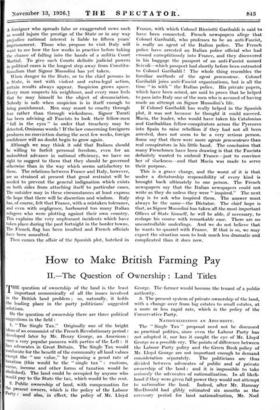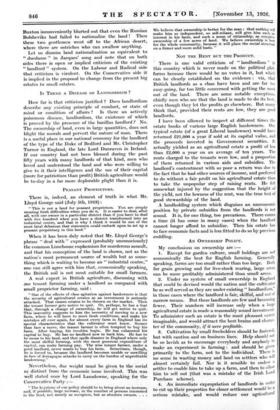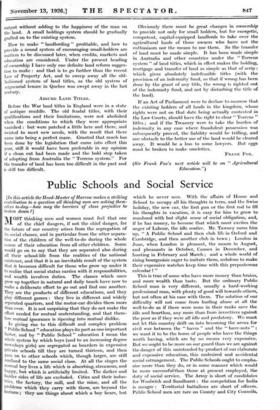How to Make British Farming Pay
II.--The Question of Ownership : Land Titles THE question of ownership of the land is the least important economically of all the issues involved in the British land problem ; so, naturally, it holds the leading place in the party politicians' suggested solutions.
On the question of ownership there are three political suggestions in the field : 1. " The Single Tax." Originally one of the bright ideas of an economist of the French Revolutionary period : developed later by Mr. Henry George, an American : once a very popular panacea with parties of the Left : it has advocates in Great Britain. The Single Tax would confiscate for the benefit of the community all land values except the " use value," by imposing a penal rate of taxation (this would be the " single tax " : customs, excise, income and other forms of taxation would be abolished). The land could be occupied by anyone who Would pay to the State the tax, which would be the rent.
2. Public ownership of land, with compensation for the present owners, which is the policy of the Litbour Party : and also, in effect,- the policy of Mr. Lloyd George. The farmer would become the tenant of a public authority.
8. The present system of private ownership of the land, with a change over from big estates to small estates, at a more or less rapid rate, which is the policy of the Conservative Party.
NATIONALIZATION AN ABSURDITY.
The " Single Tax " proposal need not be discussed as practical politics, since even the Labour Party has not adopted it, nor has it caught the eye of Mr. Lloyd George as a possible cry. The points of difference between the Labour Party policy and the Green Book policy of Mr. Lloyd George are not important enough to demand consideration separately. The politicians are thus divided between advocates of public and of private ownership of the land : and it is impossible to take seriously the advocates of nationalization. In all likeli- hood if they were given full power they would not attempt to nationalize the land. Indeed, after Mr. Ramsay MacDonald had glibly estimated six months as the necessary period for land nationalization, Mr. Noel Buxton inconveniently blurted out that even the Russian Bolsheviks had failed to nationalize the land ! Then these two gentlemen went off to the African desert, where there are ostriches who can swallow anything.
Let us dismiss land nationalization as equivalent to " ducdame " in Jacques' song and note that on both sides there is open or implied criticism of the existing " landlord " system. On the Labour and Radical side that criticism is virulent. On the Conservative side it is implied in the proposal to change from the present big estates to small estates.
Is THERE A DISEASE OF LANDLORDISM ?
How far is that criticism justified ? Does landlordism describe any existing principle of conduct, or state of mind or condition of affairs ? Is there an actively poisonous disease, landlordism, the existence of which is proved by the presence of the bacillus landlord ? No. The ownership of land, even in large quantities, does not blight the morals and pervert the nature of man. There is a useful place in our national economy for the landlord of the type of the Duke of Bedford and Mr. Christopher Tumor in England, the late Lord Dunraven in Ireland. If our country had not been blessed during the past fifty years with many landlords of that kind, men who loved and understood the land and who were willing to give to it their intelligence and the use of their capital (more for patriotism than profit) British agriculture would be to-day in a far more deplorable plight than it is.
PEASANT PROPRIETORS.
There is, indeed, an element of truth in what Mr. Lloyd George said (July 5th, 1918) :
" This is not a land for peasant proprietors. You are simply creating fresh difficulties when you do it. It is easier to deal, after all, with one owner in a particular district than if you have to deal with five hundred when you have a district transformed into an industrial centre, and that is why I think it would be one of the most fatal delusions that statesmen could embark upon to set up a peasant proprietary in this land."
When it has been duly noted that Mr. Lloyd George's phrase " deal with " expressed (probably unconsciously) the common Limehouse euphemism for murderous assault, and that his conception of the land is shown, not as the nation's most permanent source of wealth but as some- thing which is waiting to become an " industrial centre," one can still agree with him that, economically speaking, the British soil is not most suitable for small farmers. A real expert in British agriculture, discussing with .me tenant farming under a landlord as compared with small proprietor farming, said : " One of the effects of class agitation against landowners is that the security of agricultural estates as an investment is seriously attacked. That causes estates to be thrown on the market. Then the tenant farmer gets notice to quit. Or, perhaps, he has a fear that, through a change of ownership, ho will get notice to quit. This insecurity suggests to him the necessity of moving to a new farm, where he will have to meet fresh conditions, and make his mistakes all over again, for almost every farm in England has its special characteristics that the cultivator must know. Sooner than face a move, the tenant farmer is often tempted to buy his farm. After buying, his troubles begin. He has exhausted his capital to buy. He has no landlord now to back him. He has to be mean to his land, and that spells disaster in England where only the most skilful farming, with the most generous expenditure of capital, can make farming pay. The wise tenant farmer, under a good landlord, never wants to buy his farm. Sometimes, though, ho is forced to, because the landlord becomes unable or unwilling in face of demagogue attacks to carry on the burden of unprofitable landowning."
Nevertheless, due weight must be given to the social as distinct from the economic issue involved. This was well stated once by Lord Lansdowne, speaking for the Conservative Party :- " The keystone of our policy ahnirld be to bring about an increase, and, if possible, large increase, in the number of persons interested in • the land, not merely as occupiers, but as absolute owners. . . . We believe that ownership is better for the man : that nothing will make him so independent, so self-reliant, will give him such as interest in his farm, and such a sense of citizenship, as complete ownership of a few acres of land. We believe ownership is bed for the whole community, because it will place the social structure on a Sneer and more solid basis. "
NOT THE RENT BUT THE PRODUCT.
There is one valid criticism of " landlordism in this country which is never made on the political plat- forms because there would be no votes in it, but which can be clearly established on the evidence : viz, that British landlords as a class have been and are far too easy-going, far too little concerned with getting the most out of the land. There are some notable exceptions, chiefly men who see that the land is made to do its best, even though they let the profits go elsewhere. But many think that, provided their rents are low, they are good landlords.
I have been allowed to inspect at different times the estate books of various large English landowners. One typical estate (of a great Liberal landowner) would have returned £21,000 a year if sold at its capital value, and the proceeds invested in Government securities. It actually yielded as an agricultural estate a profit of less than £2,000 a year on an average of ten years. The rents charged to the tenants were low, and a proportion of them returned in various aids and subsidies. The landlord's contentment with so poor a return was due to the fact that he had other sources of income, and preferred to do without a fair profit on his agricultural estate than to take the unpopular step of raising rents. He felt somewhat injured by the suggestion that the height of the yield, not the lowness of the rent, was the true test of good stewardship of the land.
A landholding system which disguises an uneconomic position by private subsidies from the landlords is not sound. It is, for one thing, too precarious. There comes a time (it has come in many cases) when the landlord cannot longer afford to subsidize. Then his estate has to face economic facts and is less fitted to do so by previous coddling.
AN OWNERSHIP POLICY.
My conclusions on ownership are :- 1. Except for garden culture, small holdings are not economically the best for English farming. Generally speaking, farms are too small rather than too large. Both for grain growing and for live-stock rearing, large areas can be more profitably administered than small areas.
2. Under no system of small ownership in England that could be devised would the nation and the cultivator be as well served as they are under existing " landlordism," in those cases where the landlord is fair, skilful, and not of narrow means. But these landlords are few and becoming fewer. Their numbers will increase only when a large agricultural estate is made a reasonably sound investment. To administer such an estate is the most pleasant career imaginable, and would attract the best brains and charac- ter of the community, if it were profitable. 8. Cultivation by small freeholders should be fostered, but with caution and on business lines. Help should not be so lavish as to encourage everybody and anybody to make an experiment in farming : and should be given primarily to the farm, not to the individual. There is no sense in wasting money and land on settlers who will almost certainly fail. Nor is it sensible to endow a settler to enable him to take up a farm, and then to allow him to sell out (that was a mistake of the Irish Land Purchase scheme). 4. An immediate expropriation of landlords in order to cut up their properties for closer settlement would he a serious mistake, and would reduce our agricultural output without adding to the happiness of the man on the land. A small holdings system should be gradually grafted on to the existing system.
How to make " landlording " profitable, and how to provide a sound system of encouraging small-holders are matters to be discussed later, when credits, markets and education are considered. Under the present heading of ownership I have only one definite land reform sugges- tion to make : and that is to go further than the recent Law of Property Act, and to sweep away all the old- fashioned system of land titles, as the old system of seigneurial tenure in Quebec was swept away in the last century.
ABSURD LAND TITLES.
Before the War land titles in England were in a state of antique muddle. The old feudal titles, with their qualifications and their limitations, were not abolished when the conditions to which they were appropriate vanished : but were patched a little here and there, and twisted to meet new needs, with the result that there came into being a perfect maze. Granted that much has been done by the legislation that came into effect this year, still it would have been preferable in my opinion if a clean cut had been made and the bold step taken of adopting from Australia the " Torrens system." For the transfer of land has been too difficult in the past and is still too difficult. Obviously there must be great changes in ownership to provide not only for small holders, but for energetic, competent, capital-equipped landlords to take over the agricultural lands of those owners who have not the enthusiasm nor the means to use them. So the transfer of land must be made simple. It has been made simple in Australia and other countries under the " Torrens system " of land titles, which in effect makes the holding, mortgage and transfer of land as simple as that of scrip : which gives absolutely indefeasible titles (with the provision of an indemnity fund, so that if wrong has been done by the grant of any title, the wrong is righted out of the indemnity fund, and not by disturbing the title of the land).
If an Act of Parliament were to declare to-morrow that the existing holders of all lands in the kingdom, whose rights were not on that date being actually contested in thp Law Courts, should have the right to clear " Torrens " titles ; and if the Treasury were to take the burden of indemnity in any case where fraudulent possession was subsequently proved, the liability would be trifling, and one obstacle to the better use of the land would be cleared away. It would be a loss to some lawyers. But eggs must be broken to make omelettes.
FRANK Fox.
(Sir Frank Fox's next article will be on " Agricultural Education.")
















































 Previous page
Previous page